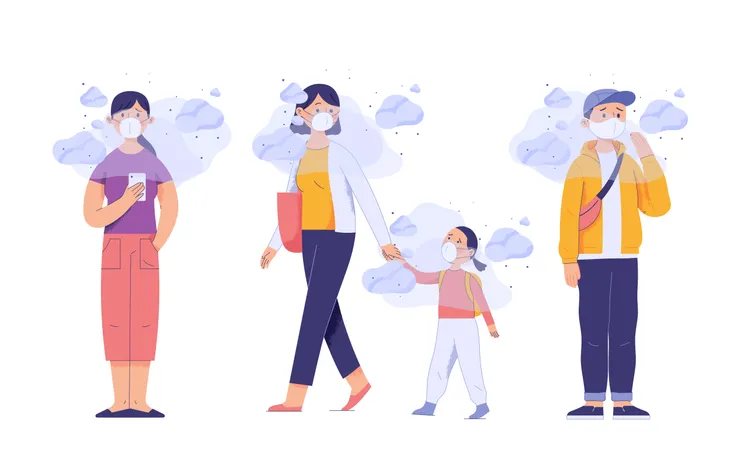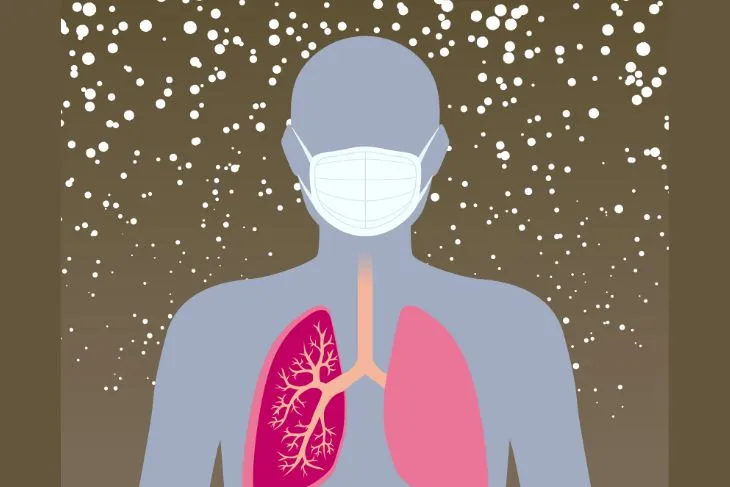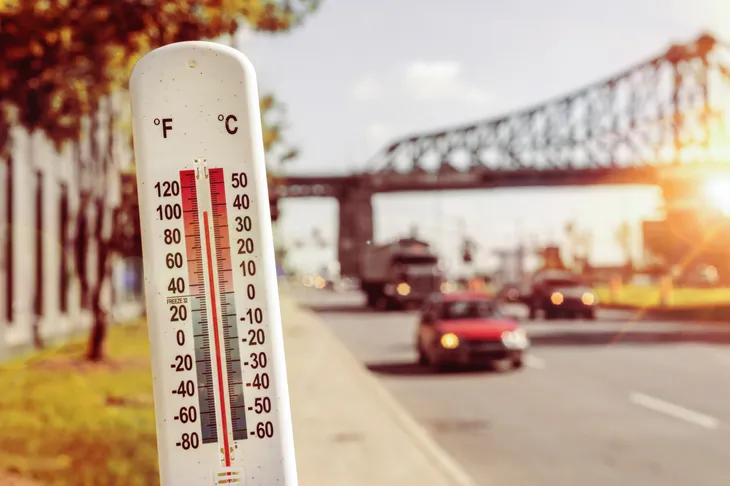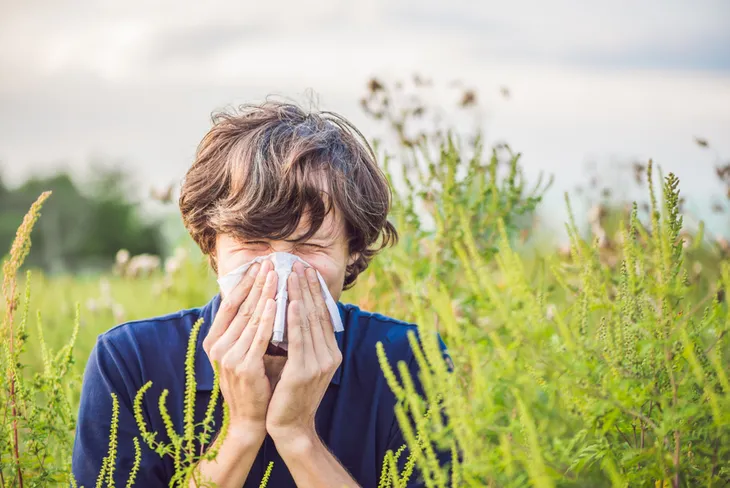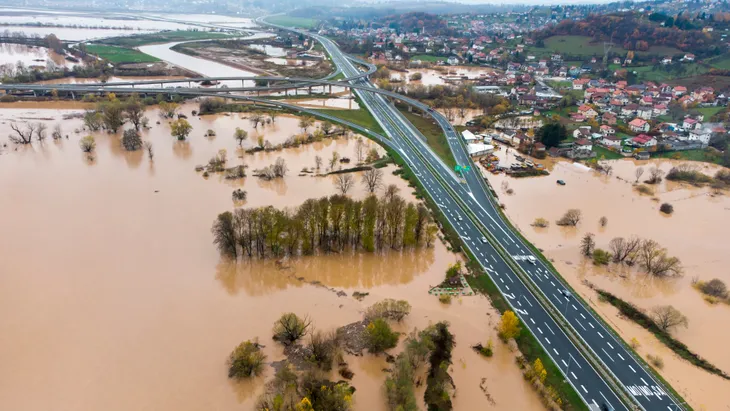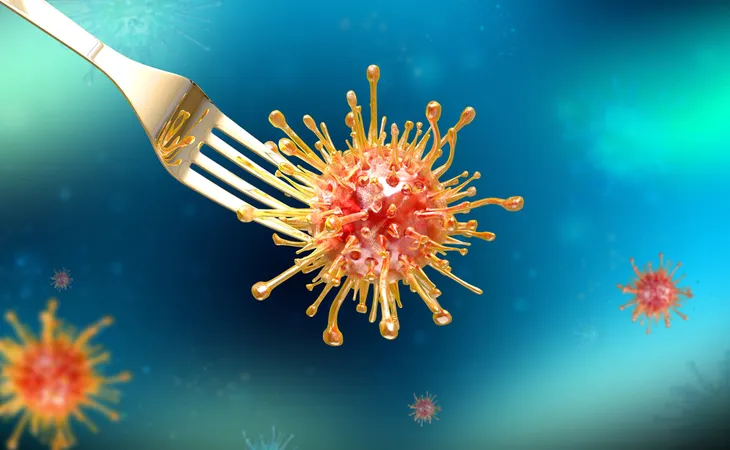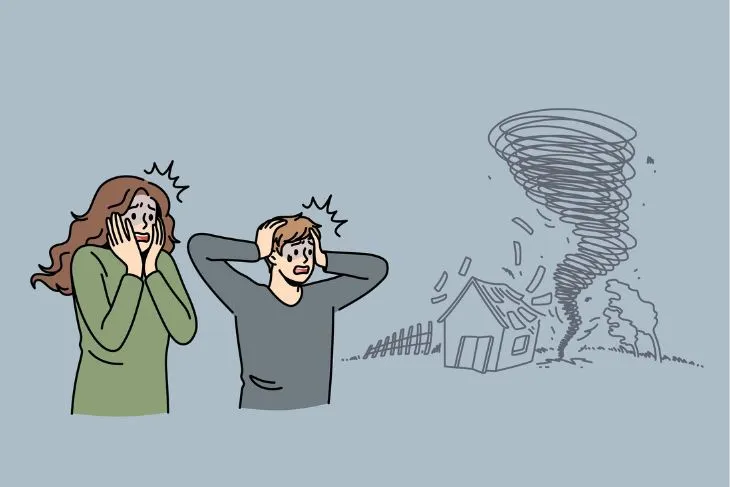- Climate change poses a real threat to not only our planet, but also our physical and mental health.
- Rising temperatures threaten illnesses like heat stroke, dehydration, heat exhaustion, as well as cardiovascular, respiratory, and cerebrovascular disease.
- Air quality will worsen leading to asthma attacks, and other respiratory and cardiovascular health effects.
- The threat or occurrence of extreme weather events can severely affect our mental health by causing stress, anxiety, and even PTSD.
When we think of climate change we often think of its effects on our planet and society as a whole. What will happen to all the endangered species, the glaciers, or the rainforest? How will it impact people who live close to rising ocean levels or the equator where temperatures are rising? Will we one day be fighting over natural resources like fresh water?
We also need to think about how it will and is affecting our own personal mental and physical health. WebMD warns that extreme heat, poor air quality, and disease-carrying insects are just a few of the things we need to worry about when it comes to climate change. All of these pose some kind of threat or harm to human health. To learn more, here’s a deeper look into the impacts of climate change on our health…
Air Quality
While the United States has made improvements to their air quality since the 1970s, according to the United States Environmental Protection Agency (EPA), as of 2014, 57 million Americans lived in counties that didn’t meet national air quality standards. The effects of climate change will likely make these conditions even worse.
“Warmer temperatures and shifting weather patterns can worsen air quality, which can lead to asthma attacks and other respiratory and cardiovascular health effects,” writes EPA. As climate change continues there’s expected to be an increase in wildfires which create smoke and other unhealthy pollutants. Rising temperatures and carbon dioxide levels will also affect airborne allergens.
Increase in Ozone
When temperatures rise, air quality decreases. Hot days cause levels of ozone to rise in the atmosphere and climate change brings more hot days. As a result, we’ll be more frequently exposed to unhealthy levels of this air pollutant. “Ground-level ozone (a key component of smog) is associated with many health problems, such as diminished lung function, increased hospital admissions and emergency room visits for asthma, and increases in [people passing away prematurely],” writes the Centers for Disease Control and Prevention (CDC).
Ground-level ozone can damage lung tissue, reduce lung function, and inflame airways, warns EPA. Children, older adults, people who work outside, and those with asthma or other lung diseases are at risk. “Because warm, stagnant air tends to increase the formation of ozone, climate change is likely to increase levels of ground-level ozone in already-polluted areas of the United States and increase the number of days with poor air quality,” writes the source.
Changes in Particulate Matter
This is a term used to describe extremely small particles and liquid droplets suspended in the atmosphere, explains EPA. Some occur naturally (i.e. dust, wildfire smoke, and sea spray), while others are created by human activities (i.e. burning fossil fuels). “These particles may be emitted directly or may be formed in the atmosphere from chemical reactions of gases such as sulfur dioxide, nitrogen dioxide, and volatile organic compounds,” writes EPA.
Particulate matter can cause a broad range of health effects including lung cancer, chronic obstructive pulmonary disease (COPD), and cardiovascular disease. If the number of wildfires increase, the particulate matter from them can be carried long distances. Also, EPA notes that older adults are more vulnerable and at a higher risk of hospitalization and fatality.
Scientists are still not sure if climate change will increase or decrease the particulate matter in the U.S. They can be removed by rainfall which may increase in quantity due to climate change, but not frequency. Also, stagnant air episodes, wind patterns, and emissions from vegetation can all affect particulate matter levels.
Heatwaves
One of the most prominent impacts of climate change and one most people are already enduring is an increase in temperature. The days are hotter, more frequent, and heat waves are lasting longer. “More than one-third of heat-related [fatalities] around the world can be linked to climate change from human activities,” writes WebMD when citing a recent study. The source also notes that in the U.S. alone, heat causes 5,600 fatalities each year.
Extreme heat can lead to heat stroke, heat exhaustion, dehydration, as well as cardiovascular, respiratory, and cerebrovascular disease. Not only that, but WebMD explains that it also affects how our body functions when it comes to maintaining a fluid balance. Older adults and people with chronic illnesses like asthma or diabetes will be particularly vulnerable. Also, people who can’t afford or don’t have access to air conditioning.
People taking medications like blood pressure medicines and SSRI antidepressant will be affected because these medications are among the many that affect the way our body responds to heat, writes WebMD. In addition to these, people who take diuretics to lower their blood pressure will dehydrate more quickly in the heat.
Allergens and Asthma Triggers
Climate change can impact allergies and respiratory health because rising temperatures increases the amount of pollen in the air. According to EPA, about one-third of the U.S. population suffers from allergic illnesses, like hay fever. On top of that, 34 million Americans have asthma.
EPA points out that researchers have noticed the spring pollen season occurs earlier in the U.S. for certain plants. There’s also an increase in the length of the season for plants like ragweed. This is likely due to the fact that our seasons are changing. Spring comes sooner and fall starts later, leading to a longer allergy season, says Kristie Ebi, PhD, a professor in the Center for Health and the Global Environment at the University of Washington to WebMD. “With higher carbon dioxide in the atmosphere, plants are growing faster and some of them are producing more pollen.”
Impact of Extreme Weather Events
Extreme weather events are increasing due to climate change. These events include extreme precipitation, flooding, droughts and storms. All of these threaten the health of people both during and after the event, says EPA. The highest risk people are older adults, young children, and people with disabilities or medical conditions. According to EPA, the following are all ways that extreme events can affect human health…
- Reduce the availability of safe food and drinking water
- Damage roads and bridges which disrupts access to hospitals and pharmacies
- Interrupt communication, utility, and health care services
- Contribute to carbon monoxide poisoning from improper use of portable electric generators during and after storms
- Increase stomach and intestinal illness
- Create or worsen mental health impacts, such as depression and post-traumatic stress disorder (PTSD)
If there are emergency evacuations, older adults with limited mobility who need to use elevators are at risk during power outages. Other complications include the transfer of medical records, medication, and medical equipment, explains EPA. Individuals with disabilities will be disproportionately affected if unable to access evacuation routes, have difficulty understanding or receiving warnings, or limited ability to communicate.
Disease Spreading Insects
Insects like mosquitoes, ticks, and fleas love warm weather, and WebMD notes that mosquitos in particular love carbon dioxide. Rising temperatures allow these bugs to migrate north and carry viruses like West Nile, Zika, and chikungunya. “These vectors can carry infectious pathogens, such as viruses, bacteria, and protozoa, from animals to humans,” writes EPA. Right now the geographic range of ticks that carry Lyme disease is hindered by temperature. If temperatures rise, these ticks will likely become more active earlier in the season and their range will expand northward.
Rising temperatures aren’t the only issue. WebMD points out that intense storms bring flooding which presents the perfect breeding condition for germs that carry infectious diseases like cryptosporidiosis, giardia, leptospirosis, and cholera. “We have many studies showing that heavy rainfall events are causing outbreaks of waterborne diseases,” says Aaron Bernstein, MD, interim director of the Center for Climate, Health, and the Global Environment at the Harvard T.H. Chan School of Public Health to WebMD. “We see the evidence that greenhouse gases are driving heavier downpours.”
Water-Related Illnesses
Higher temperatures, frequent heavy rains and run off, and the general effect of storms poses a threat to our recreational and drinking water. The health impact may include gastrointestinal illnesses, effects on the body’s nervous and respiratory system, and liver or kidney damage, warns EPA. All of these things increase humans risk of exposure to waterborne pathogens (bacteria, viruses, and parasites), toxins produced by harmful algal and Cyanobacteria blooms in the water, as well as chemicals that end up in the water from human activity.
The EPA explains that a change in water temperature means “that waterborne Vibrio bacteria and harmful algal toxins will be present in the water or in seafood at different times of the year, or in places where they were not previously threats.” Lastly, runoff and flooding from an increase in precipitation, hurricane rainfall, and storm surges will contaminate bodies of water used for recreational swimming, shellfish harvesting waters, and sources of drinking water.
Food Safety and Nutrition
Climate change has a direct impact on our access to food due to higher concentrations of carbon dioxide and extreme weather events. According to EPA, higher temperatures increase the number of Salmonella and other bacteria-related food poisoning cases (bacteria likes warm environments). Climate change will also impact the risk of exposure to chemical contaminants in food. “For example, higher sea surface temperatures will lead to higher mercury concentrations in seafood, and increases in extreme weather events will introduce contaminants into the food chain through stormwater runoff,” writes the source.
Other impacts to food safety and nutrition are higher concentrations of carbon dioxide in the air. This can act as a fertilizer for some plants, but lowers the level of protein and minerals in crops like wheat, rice, and potatoes. Also, extreme weather events hinder the ability to distribute food if roads and waterways are damaged.
Mental Health
Climate change can have a major impact on mental health. Research shows that every time temperatures rise, the rate of homicide and people taking their life increases, says WebMD. Increasing temperatures make it harder for people to sleep which affects their mental health. Also, according to the CDC, patients with severe mental illness are at risk because their medication may interfere with temperature regulation or cause hyperthermia.
Experiencing an extreme weather event, such as a hurricane or wildfire, can also cause an immense amount of stress. This effect is two-fold if they’ve lost a loved one or their home. “Research demonstrated high levels of anxiety and post-traumatic stress disorder among people affected by Hurricane Katrina and similar observations have followed floods and heat waves,” writes the CDC. Wildfires can have a similar effect. All of these events are fuelled by climate change.
Even people who haven’t felt the direct effect of climate change carry a general sense of unease and anxiety, adds WebMD. Reading about the latest pandemic or extreme weather event is stressful. Experts call this “eco-anxiety.” It’s the constant looming threat that creates worry amongst the general population.
Developmental and Neurological Issues
Scientists now believe that climate change can actually impact our neurological health. The impact is due to exposure to toxins in the environment and the stress-related effects of climate change. According to the National Institute of Environment Health Sciences, scientists believe environmental factors play a role in the development of Parkinson’s and Alzheimer’s disease.
There is also a belief that toxins in food and water can cause health issues in a developing fetus. “For example, climate change can cause harmful algal blooms, which increase the bio toxins in fish and seafood,” writes Medical News Today. “An increase in heavy metals, such as mercury and lead, contaminating seafood can lead to a reduced IQ in a developing fetus.”
What Can We Do?
Climate change can often feel overwhelming and seemingly impossible to tackle. How can the actions of one individual make any kind of indent in the issues at hand? While one person might not have much of an impact, if we all do a little bit, it will add up to a lot!
Unfortunately a lot of the man power lies in our governments. And to be fair, some governments have been trying to make a difference. For example, the Clean Air Act has successfully reduced air pollution from cars and factories, notes WebMD. But we need to also do our part to contribute to the solution. The same source provides a few good examples of where to start.
- Buy energy efficient appliances and vehicles
- Recycle paper and plastic
- Walk or bike to work when possible
- Turn up the thermostat a degree
- Switch off lights when leaving a room
Lastly, elect people into office who align with your values and share the same concerns on climate change. We need people who will take action and make moves to address it. “At the end of the day, voting is by far one of the most important things we can do,” says Bernstein to WebMD.

